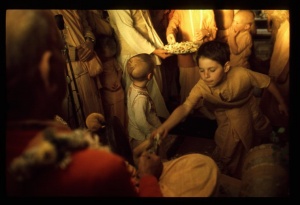CC Madhya 2.85 (1975): Difference between revisions
(Vanibot #0027: CCMirror - Mirror CC's 1996 edition to form a basis for 1975) |
(Vanibot #0020: VersionCompareLinker - added a link to the Version Compare feature) |
||
| Line 2: | Line 2: | ||
<div style="float:left">'''[[Sri Caitanya-caritamrta (1975)|Śrī Caitanya-caritāmṛta (1975)]] - [[CC Madhya (1975)|Madhya-līlā]] - [[CC Madhya 2 (1975)|Chapter 2: The Ecstatic Manifestations of Lord Śrī Caitanya Mahāprabhu]]'''</div> | <div style="float:left">'''[[Sri Caitanya-caritamrta (1975)|Śrī Caitanya-caritāmṛta (1975)]] - [[CC Madhya (1975)|Madhya-līlā]] - [[CC Madhya 2 (1975)|Chapter 2: The Ecstatic Manifestations of Lord Śrī Caitanya Mahāprabhu]]'''</div> | ||
<div style="float:right">[[File:Go-previous.png|link=CC Madhya 2.84 (1975)|Madhya-līlā 2.84]] '''[[CC Madhya 2.84 (1975)|Madhya-līlā 2.84]] - [[CC Madhya 2.86 (1975)|Madhya-līlā 2.86]]''' [[File:Go-next.png|link=CC Madhya 2.86 (1975)|Madhya-līlā 2.86]]</div> | <div style="float:right">[[File:Go-previous.png|link=CC Madhya 2.84 (1975)|Madhya-līlā 2.84]] '''[[CC Madhya 2.84 (1975)|Madhya-līlā 2.84]] - [[CC Madhya 2.86 (1975)|Madhya-līlā 2.86]]''' [[File:Go-next.png|link=CC Madhya 2.86 (1975)|Madhya-līlā 2.86]]</div> | ||
{{CompareVersions|CC|Madhya 2.85|CC 1975|CC 1996}} | |||
{{RandomImage}} | {{RandomImage}} | ||
==== TEXT 85 ==== | ==== TEXT 85 ==== | ||
<div class="verse"> | <div class="verse"> | ||
:yadi keha hena kaya, | :yadi keha hena kaya, grantha kaila śloka-maya, | ||
:itara jane nāribe bujhite | :itara jane nāribe bujhite | ||
:prabhura yei ācaraṇa, | :prabhura yei ācaraṇa, sei kari varṇana, | ||
:sarva-citta nāri ārādhite | :sarva-citta nāri ārādhite | ||
</div> | </div> | ||
| Line 20: | Line 19: | ||
<div class="synonyms"> | <div class="synonyms"> | ||
yadi-if; keha-someone; hena-thus; kaya-says; grantha-this book; kaila-is made; śloka-maya-with various Sanskrit verses; itara-ordinary; jane-persons; nāribe bujhite-will not be able to understand; prabhura-of Lord Śrī Caitanya Mahāprabhu; yei-whatever; ācaraṇa-activities; sei-that; kari-I do; varṇana-description; sarva-citta-all hearts; nāri-I am unable; ārādhite-to please. | |||
</div> | </div> | ||
| Line 34: | Line 33: | ||
<div class="purport"> | <div class="purport"> | ||
Śrīla Kavirāja Gosvāmī and one who follows in his footsteps do not have to cater to the public. Their business is simply to satisfy the previous ācāryas and describe the pastimes of the Lord. One who is able to understand can relish this exalted transcendental literature, which is actually not meant for ordinary persons like scholars and literary men. Generally, Śrī Caitanya | Śrīla Kavirāja Gosvāmī and one who follows in his footsteps do not have to cater to the public. Their business is simply to satisfy the previous ācāryas and describe the pastimes of the Lord. One who is able to understand can relish this exalted transcendental literature, which is actually not meant for ordinary persons like scholars and literary men. Generally, Śrī Caitanya Mahāprabhu's pastimes recorded in Caitanya-caritāmṛta are studied in universities and scholastic circles from a literary and historical point of view, but actually Caitanya-caritāmṛta is not a subject matter for research workers or literary scholars. It is simply meant for those devotees who have dedicated their lives to the service of Śrī Caitanya Mahāprabhu. | ||
</div> | </div> | ||
Latest revision as of 12:33, 27 January 2020

A.C. Bhaktivedanta Swami Prabhupada
TEXT 85
- yadi keha hena kaya, grantha kaila śloka-maya,
- itara jane nāribe bujhite
- prabhura yei ācaraṇa, sei kari varṇana,
- sarva-citta nāri ārādhite
SYNONYMS
yadi-if; keha-someone; hena-thus; kaya-says; grantha-this book; kaila-is made; śloka-maya-with various Sanskrit verses; itara-ordinary; jane-persons; nāribe bujhite-will not be able to understand; prabhura-of Lord Śrī Caitanya Mahāprabhu; yei-whatever; ācaraṇa-activities; sei-that; kari-I do; varṇana-description; sarva-citta-all hearts; nāri-I am unable; ārādhite-to please.
TRANSLATION
If one says that Śrī Caitanya-caritāmṛta is full of Sanskrit verses and therefore not understandable by a common man, I reply that what I have described are the pastimes of Śrī Caitanya Mahāprabhu and that for me to satisfy everyone is not possible.
PURPORT
Śrīla Kavirāja Gosvāmī and one who follows in his footsteps do not have to cater to the public. Their business is simply to satisfy the previous ācāryas and describe the pastimes of the Lord. One who is able to understand can relish this exalted transcendental literature, which is actually not meant for ordinary persons like scholars and literary men. Generally, Śrī Caitanya Mahāprabhu's pastimes recorded in Caitanya-caritāmṛta are studied in universities and scholastic circles from a literary and historical point of view, but actually Caitanya-caritāmṛta is not a subject matter for research workers or literary scholars. It is simply meant for those devotees who have dedicated their lives to the service of Śrī Caitanya Mahāprabhu.